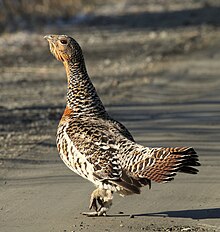Wood grouse
| Western capercaillie | |
|---|---|
 |
|
| Male (cock) | |
 |
|
| Female (hen) | |
| Scientific classification | |
| Kingdom: | Animalia |
| Phylum: | Chordata |
| Class: | Aves |
| Order: | Galliformes |
| Family: | Phasianidae |
| Genus: | Tetrao |
| Species: | T. urogallus |
| Binomial name | |
|
Tetrao urogallus Linnaeus, 1758 |
|
 |
|
| Western Capercaillie range | |
 |
|
| Distribution in Europe | |
The western capercaillie (Tetrao urogallus), also known as the wood grouse, heather cock, or just capercaillie /ˌkæpərˈkeɪli/, is the largest member of the grouse family. The largest known specimen, recorded in captivity, had a weight of 7.2 kg (16 lb). The species shows extreme sexual dimorphism, with the male twice the size of the female. Found across Eurasia, this ground-living forest bird is renowned for its mating display. The worldwide population is categorised as "Least concern" by the IUCN.
The species was first described by Linnaeus in his Systema naturae in 1758 under its current binomial name.
Its closest relative is the black-billed capercaillie, Tetrao parvirostris, which breeds in the larch taiga forests of eastern Russia and parts of northern Mongolia and China.
There are several subspecies, listed from west to east:
The subspecies show increasing amounts of white on the underparts of males from west to east, almost wholly black with only a few white spots underneath in western and central Europe to nearly pure white in Siberia, where the black-billed capercaillie occurs. Variation in females is much less.
The native Scottish population, which became extinct between 1770 and 1785, was probably a distinct subspecies, though it was never formally described as such; the same is likely of the extinct Irish population.
Western capercaillies are known to hybridise occasionally with black grouse (these hybrids being known by the German name Rackelhahn) and the closely related black-billed capercaillie.
...
Wikipedia

